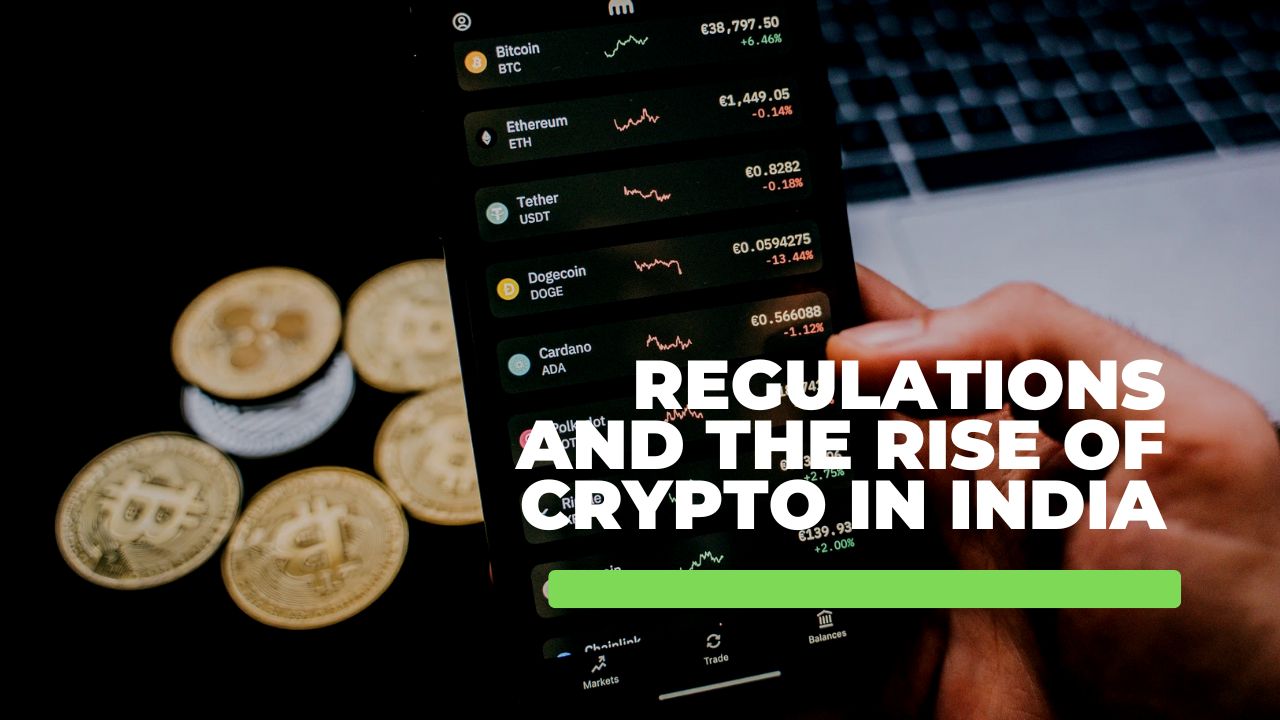The world of cryptocurrency has exploded in recent years, captivating investors and sparking curiosity worldwide. This trend is no different in India, where a growing number of individuals are looking to explore the potential of digital assets. However, the Indian crypto landscape remains shrouded in a bit of mystery, with regulations still under development. So, what’s the deal with cryptocurrency in India? Buckle up, because we’re diving into the maze of regulations and the exciting rise of digital assets in the world’s largest democracy.
Table of Contents
Cryptocurrency in India: A Quick Detour
Before we delve into the regulatory labyrinth, let’s take a quick pitstop to understand the basics. Cryptocurrency, in essence, is a digital form of money that utilizes blockchain technology for secure transactions. Unlike traditional rupees, crypto isn’t controlled by a central bank, but rather operates on a decentralized network. This unique characteristic has opened doors for innovation and alternative investment opportunities.
The Murky Waters of Regulation
Now, back to India. Unlike El Salvador, which recently adopted Bitcoin as legal tender, cryptocurrencies in India don’t enjoy the same official status. The Reserve Bank of India (RBI), the country’s central bank, has expressed concerns about crypto’s potential impact on financial stability and money laundering activities. This has led to a somewhat murky regulatory environment.
In 2021, a ray of hope emerged with the proposal of the “Cryptocurrency and Regulation of Official Digital Currency Bill.” This bill, however, has yet to be passed, leaving many wondering about its ultimate aim. Some speculate it might pave the way for a complete ban on private cryptocurrencies, while others believe it could establish a framework to regulate the market.
Adding another layer of complexity is the Supreme Court’s 2020 verdict. The court acknowledged the dual nature of crypto assets – while not considered legal tender, they can function similarly. This decision further emphasizes the need for clear regulations to navigate this uncharted territory.
Taxation: A Tentative Step Forward
In a move that some interpret as a “tax first, regulate later” approach, the Indian government decided to impose a 30% tax on crypto gains and a 1% TDS (Tax Deducted at Source). This step acknowledges the existence of crypto within the financial ecosystem, but the lack of accompanying regulatory clarity leaves investors in a bit of a bind. Imagine paying taxes on something whose legal status is uncertain – that’s the current conundrum for many crypto enthusiasts in India.
The Road Ahead: A Glimpse into the Future
So, what does the future hold for crypto in India? It’s still too early to say for sure. Some potential scenarios include a complete ban, a regulated market with clear guidelines, or even the introduction of a government-issued digital currency (CBDC).
The ongoing debate highlights a crucial point – the Indian government is actively exploring the potential of blockchain technology, the backbone of cryptocurrencies. This focus on the underlying technology suggests a willingness to embrace innovation while ensuring financial stability and consumer protection. With this in mind, it’s safe to say that India has the potential to become a major player in the future crypto space, provided clear and well-defined regulations are established.
Addressing Common Concerns
The world of cryptocurrencies can be intimidating, especially for newcomers. Here are some common concerns people often have:
- Volatility: Crypto markets can be quite volatile, meaning prices can fluctuate rapidly. This can be risky for investors, so thorough research and a well-defined investment strategy are crucial.
- Security: Like any online activity, there are security risks involved with cryptocurrency. Choosing reputable exchanges with robust security measures is essential to protect your digital assets.
Safe Trading Practices for Indian Users
- Do your research: Before investing in any cryptocurrency in India, thoroughly research the project, its technology, and the team behind it.
- Start small: Don’t jump in headfirst. Start with a small investment to understand the market and your own risk tolerance.
- Choose a reputable exchange: Opt for well-established exchanges with strong security protocols to safeguard your crypto holdings.
- Store your crypto securely: Consider using a hardware wallet for an extra layer of security, especially if you’re investing in significant amounts.
- Stay informed: Keep yourself updated on the latest regulations, news, and trends in the Indian crypto space.
- Seek professional advice: Consulting a qualified financial advisor experienced in crypto can be beneficial, especially for making informed investment decisions.
With a cautious yet optimistic outlook, India seems poised to play a significant role in the future of cryptocurrencies. As regulations become clearer and the ecosystem matures, digital assets have the potential to revolutionize the way we think about money and financial transactions in India. Investing in cryptocurrency can be considered as a passive income source.
For our readers who might be new to the world of cryptocurrency, here’s a quick glossary to explain some key terms used throughout the blog:
- Blockchain: A digital ledger of transactions that is duplicated and distributed across a network of computers. This ensures security and transparency in crypto transactions.
- Decentralized Network: Unlike traditional financial systems controlled by central authorities, cryptocurrencies operate on decentralized networks, meaning no single entity has complete control.
- Bitcoin: The first and most well-known cryptocurrency, often referred to as the “digital gold.”
- Altcoin: Any cryptocurrency other than Bitcoin. There are thousands of altcoins available, each with its unique features and purposes.
- CBDC (Central Bank Digital Currency): A digital version of a country’s official currency issued and controlled by its central bank.
- Volatility: The tendency of an asset’s price to fluctuate significantly over short periods. Cryptocurrencies are known for their high volatility.
- Hardware Wallet: A physical device used to store cryptocurrencies offline, offering an extra layer of security compared to online wallets.
- TDS (Tax Deducted at Source): A tax collected at the source of income, in this case, when crypto gains are realized.
We hope this glossary helps clarify any unfamiliar terms encountered in the blog post.
Frequently Asked Questions (Optional Section)
1. Is cryptocurrency legal in India?
Cryptocurrencies are not currently recognized as legal tender in India. However, the government has imposed taxes on crypto gains and TDS, indicating a potential shift towards regulation rather than a complete ban.
2. Can I invest in cryptocurrency in India?
Yes, you can invest in cryptocurrency through various cryptocurrency exchanges operating in India. However, it’s crucial to choose a reputable exchange with strong security measures and be aware of the associated risks due to the volatile nature of the market and the evolving regulatory landscape.
3. What are the risks of investing in cryptocurrency?
Cryptocurrency markets are highly volatile, meaning prices can swing drastically in short periods. Additionally, there are security risks involved, with the possibility of hacking or exchange malfunctions. Thorough research and a well-defined investment strategy are essential to mitigate these risks.
4. Where can I learn more about cryptocurrency regulations in India?
Staying informed is key. Reliable news sources focused on the Indian financial landscape, government pronouncements, and RBI announcements are valuable resources to track developments in crypto regulations.
5. Should I seek professional advice before investing in cryptocurrency?
Consulting a qualified financial advisor experienced in crypto can be beneficial, especially for making informed investment decisions. They can help you assess your risk tolerance and develop a suitable investment strategy.
The Bottom Line
The current state of crypto regulations in India can be likened to a maze – full of twists and turns, with the final destination yet to be revealed. It’s important to stay informed about future developments, be it through government announcements, RBI pronouncements, or reliable news sources focused on the Indian financial landscape.
While there might be some temporary roadblocks, the growing interest in digital assets, coupled with the government’s focus on blockchain technology, suggests a bright future for crypto in India. Remember, staying informed and exercising caution are key as we navigate this exciting yet evolving financial frontier.












